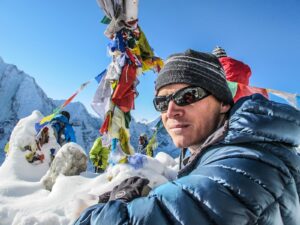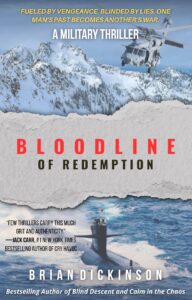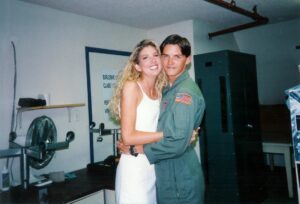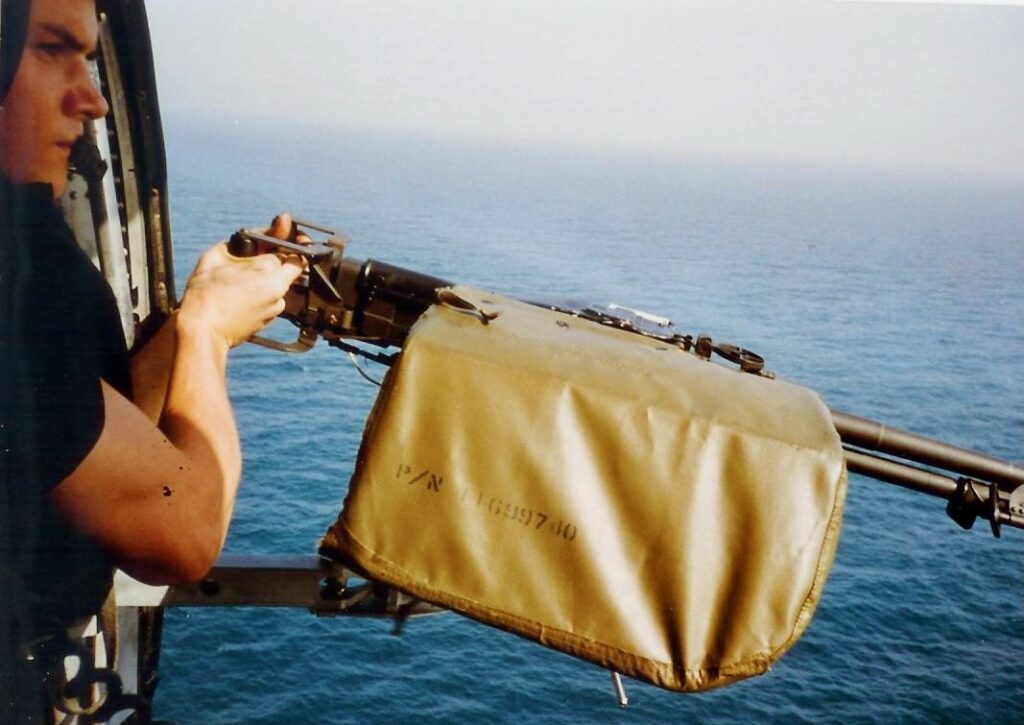(LOS ANGELES, Calif.) – Brian Dickinson, former U.S. Navy Aviation Rescue Swimmer and high-altitude mountaineer, spoke with The Click to discuss his newest book, Bloodline of Redemption.

Dickinson on his solo ascent of Mt. Everest (Credit: Brian Dickinson)
Dickinson has written two nonfiction novels: Blind Descent, which chronicled his solo summit of Mount Everest during which he overcame snow blindness, and Calm in the Chaos, about the elite Navy Aviation Rescue Swimmers Dickinson served with during two tours in the Persian Gulf.
Dickinson’s newest book, however, is a work of fiction — a military and survival thriller. It is still grounded in plenty of fact, though, as Dickinson explained in a candid interview after a pre-dawn run near his Seattle home.
This interview was edited for clarity and length.
The Click: Your latest book is a work of fiction, but there are a lot of themes that you must have drawn from your personal experience. Why did you turn to fiction?

In his latest book, Dickinson turns to nonfiction (Credit: Brian Dickinson)
Dickinson: Every book that I’ve written so far before… has been about [real] life, like, near-death experiences. I wanted to write something where I didn’t have to almost die to tell the story.
It’s traumatic retelling a lot of those stories. In the military we are conditioned to not really open up, you know, just to stuff everything down, and then once you get out, you know, you have so many suicides and just so much depression and PTSD and, you know, I was not immune to that.
…But at the same time, you’ve got to realize the audience, you also want to put them in this state as close to that red line as they possibly can be.
There are a lot of incredible, larger-than-life events that happen in the novel. For example the submarine threat to U.S. soil. I was wondering: are you taking creative license completely here or are there real-world experiences and truths that you’re writing about under the guise, so to speak, of fiction?
These things exist. The whole story, where it starts, is based on a real operation that I was involved in in ‘97…but it’s still classified. So I created a premise and alternative outcomes…..
The crew that I was with is really no longer with us. And it was untimely.
… So that’s where I just got creative in the ability to tell a realistic story…
And maybe just silently honor those that I served with.
What is your writing process?

Dickinson and his wife just prior to one of his Persian Gulf tours (Credit: Brian Dickinson)
I’m a morning person, and my wife is not a morning person. So I enjoy that morning time. Faith is really important to me. So I wake up and before I start anything I’ll make a latte, but then I’ll read the Bible verse of the day… So [that’s] like 15 or 20 minutes, and that just sets the foundation for my day…
Being in the Pacific Northwest, it’s great, because if it’s crappy outside, which it is at least through the winter months, it’s perfect writing weather.
The part I enjoy the most is really that first part where you’re creating… that arc.
I think I write like what I would read.
Is there anything in the military background that either helps or hinders your writing process?
Military wise, yeah, there are a couple components there. Just being driven, for one, but I think there’s fear in writing, because there’s so much vulnerability, and that will halt people before they even start.
To have experienced things that I’ve went through.. there’s such a high attrition rate [in the military]. [And] not many people have soloed Mount Everest. There are a lot of different things that I’ve done in my life where fear could have paralyzed me….
My advice, my encouragement, is: just write. Don’t make it perfect. Get it out there. Just write….. You’re never ready. You don’t know if tomorrow’s gonna come. Every day is a gift.


